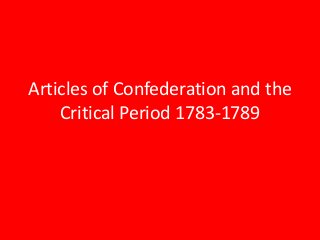
Articles of confederation and the Critical Period 1783 1789
- 1. Articles of Confederation and the Critical Period 1783-1789
- 2. Articles of Confederation • First plan for the government of the NEW United States of America. • During 2nd Continental Congress, all 13 states voted for the articles in March 1781 • The 13 states were afraid of a strong central government
- 3. Articles of Confederation • Congress was in charge of Federal Government • Federal = National = Central Government in charge of all states • Each state had one vote
- 4. POWERS of the Government according to the Articles of Confederation: 1. Congress can declare war and make peace 2. Congress can create and keep an Army and a Navy 3. Congress can print money 4. Congress can set up a postal service 5. Congress can organize new lands in the West. 6. Congress can deal with Indian issues
- 5. Land Ordinance of 1785 o New Land from the Treaty of Paris 1783 was divided into townships that were 6 Square miles. o One of the sections would be set aside to support public schools
- 6. Northwest Ordinance of 1787 o Land was divided into smaller territories with a governor o NO SLAVERY ALLOWED! o When population reached 60,000, the territory could apply to be a state. o Settlers in the territories had same rights as American citizens
- 7. Who should have more power? National Government vs. State Government National VS State • States were afraid that if the national government had too much power it would be like having a King • States argued with each other over land and money.
- 8. Weak Federal (Central) Government o Congress (Legislative Branch) A. Congress has only ONE house (part) and laws are difficult to pass B. Congress CANNOT collect taxes C. Congress CANNOT organize trade among the states or interfere with problems between the states. D. Congress was responsible to the states, not the people. o No Federal Court System (Judicial Branch) to settle disputes among the states. o No President (Executive Branch) to enforce laws.
- 9. Money Issues and DEBT 1. No U.S. Dollar 2. Each state had its own money and used foreign money as well New York $$ 3. Merchants would only accept $$ from their own state, causing other money to become worthless 4. U.S. was unable to pay its debts • Money owed to European countries • Money owed to Continental Soldiers
- 10. Domestic (at home) Problems 1. 9 of the 13 states had to approve a law before it could go into effect 2. 13 out of 13 had to approve for a law to be amended (or changed) 3. States acted like individual countries and almost never agreed on anything
- 11. Summary Which Principles of Government are present in the Articles of Confederation?